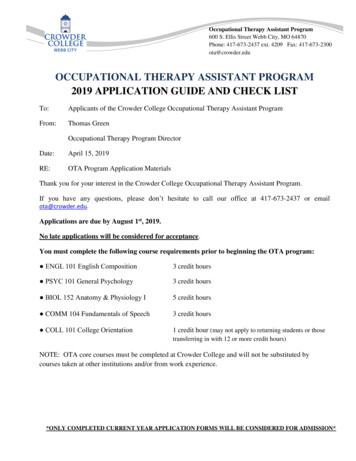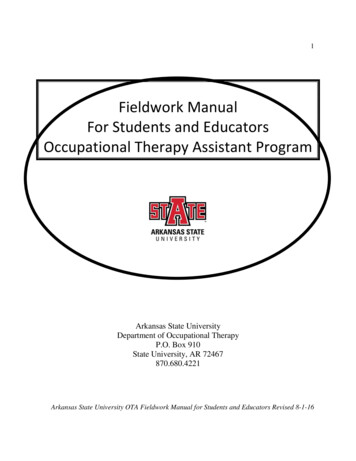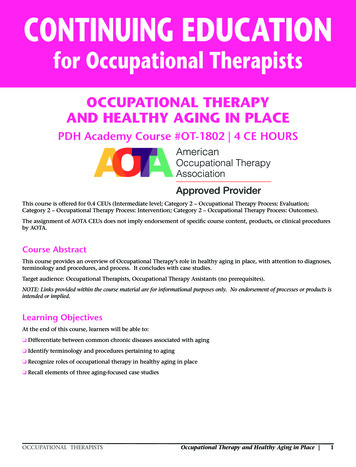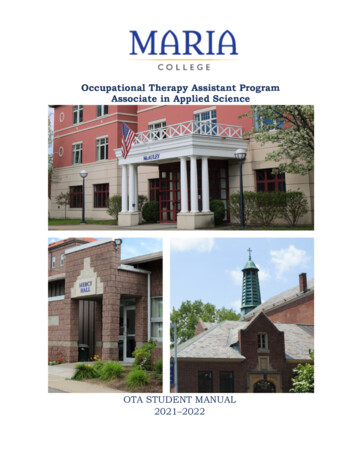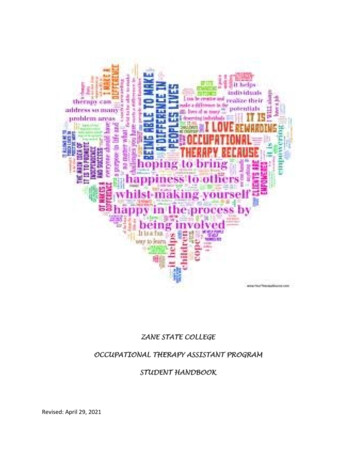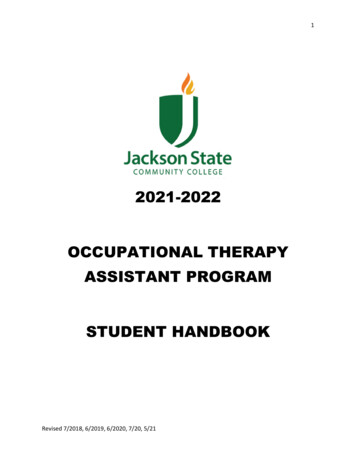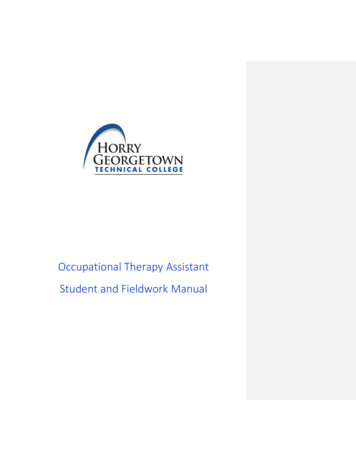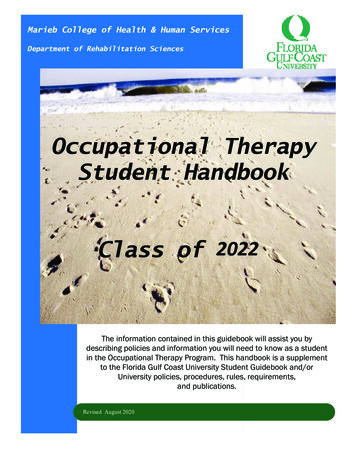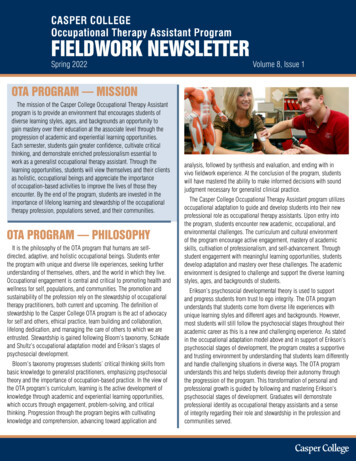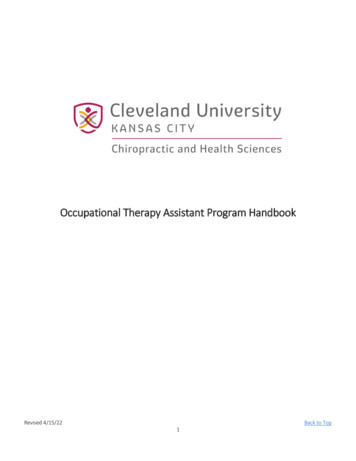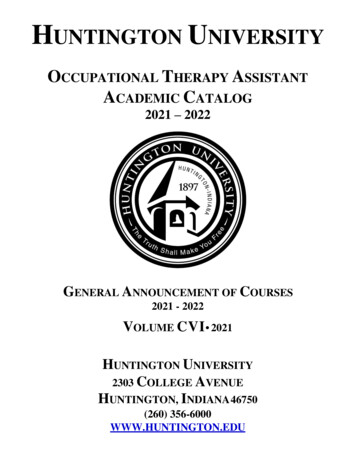
Transcription
HUNTINGTON UNIVERSITYOCCUPATIONAL THERAPY ASSISTANTACADEMIC CATALOG2021 – 2022GENERAL ANNOUNCEMENT OF COURSES2021 - 2022VOLUME CVI 2021HUNTINGTON UNIVERSITY2303 COLLEGE AVENUEHUNTINGTON, INDIANA 46750(260) 356-6000WWW.HUNTINGTON.EDU
Occupational Therapy AssistantOccupational Therapy Assistant Faculty and Staff2021-2022Nicole R. Scheiman, DrOT, MHS OTR/L .OTA Department Chair/Program Director, Associate ProfessorDeborah S. Fitzcharles, MSHS, COTA .Academic Fieldwork Coordinator, InstructorBrenda Prosser, OTR/L . Assistant ProfessorHolly D. Tester . Administrative SecretaryNatisha L. Ball, COTA . Lab ManagerProgram DescriptionThe bachelor of science degree in Occupational Therapy Assistant (OTA), offered at Huntington University’s maincampus in Huntington, Indiana, provides students with entry-level preparation for the field of occupationaltherapy as an assistant who works under the supervision of an occupational therapist. Graduates of the OTAprogram may enter the workforce following successful passing of the national exam or apply to a masters ordoctoral program to become an occupational therapist or use their bachelor’s degree to apply to other graduateprograms such as physical therapy and speech language pathology. Huntington University’s OTA program was grantedaccreditation on April 9, 2020 and is the first program to be granted accreditation for a bachelors level program in occupationaltherapy assistant. Accreditation qualifies students to sit for the national certification examination in occupationaltherapy assistant (NBCOT). Program candidates may apply for admission in their sophomore year or earlier ifthey have approved transfer credit. The goal of the OTA program is to provide a Christian learning environmentwhere compassionate care is a part of serving the health and wellness needs of others.Coursework is completed with in-depth learning in designated classrooms and laboratory space. The OTA programis located in the Dowden Science Hall on the first floor with two labs located on the lower level of the ScienceHall. Students gain mastery skills in professional writing, assessment and intervention strategies, professionalbehaviors, commitment to life-long learning, scholarship, leadership, and technology through guided learningexperiences.The central themes of Huntington University’s Bachelor of Science in Occupational Therapy Assistant Program arethe following: Christ, Scholarship, and Serviceo Personal and Professional Life Journey (modeling faith, health, leadership, scholarship, andprofessional service)o Excellence in InnovationThe mission of the occupational therapy assistant program at Huntington University focuses on the personal andprofessional journey of students through providing Christ-centered education that focuses on developingoccupational therapy practitioners who are highly skilled to provide compassionate, competent, occupation-basedinterventions, while demonstrating leadership and advocacy skills and a commitment to life-long learning.1
Program Distinctives Huntington University is an innovator in the field of occupational therapy as it has the first program toreceive accreditation to provide the OTA degree at the bachelor level.The OTA program has ties to a doctoral degree pathway option at Huntington University.Rigorous coursework provides students with comprehensive preparation.The program meets or exceeds requirements for ACOTE accreditation.Integration of faith and practice is embedded in coursework.Professors are licensed and experienced occupational therapy practitioners.Fieldwork provides students with multiple real-world clinical experiences.Accreditation Council for Occupational TherapyEducation (ACOTE)Huntington University’s baccalaureate-degree-level Occupational Therapy Assistant Program is accredited (as ofApril 9, 2020) by the Accreditation Council for Occupational Therapy Education (ACOTE) of the AmericanOccupational Therapy Association (AOTA).Additional information related to current accreditation status can be obtained from:Accreditation Council for Occupational Therapy (ACOTE)of the American Occupational Therapy Association (AOTA)6116 Executive Boulevard, Suite 200North Bethesda, MD 20852-4929Phone: 301-652-6611 Department extensions Accreditation - x2042TDD: 1-800-377-8555Fax: 301-652-7711Website: www.acoteonline.orgGraduates of the program will be eligible to sit for the national certification examination for the occupationaltherapy assistant administered by the National Board for Certification in Occupational Therapy (NBCOT). Aftersuccessful completion of this exam, the individual will be a Certified Occupational Therapy Assistant (COTA).In addition, all states require licensure in order to practice; however, state licenses are usually based on theresults of the NBCOT Certification Examination. Note that a felony conviction may affect a graduate’s ability tosit for the NBCOT Certification Examination or attain state licensure.2
Admissions PoliciesAdmission Requirements for Huntington UniversityApplication for admission to Huntington University is your first step toward becoming a part of the community.You may visit the University Web site for information and an application form at www.huntington.edu, or youmay send an e-mail to admissions@huntington.edu. You may contact the Office of Admissions at 260-359-4000or toll-free at 800-642-6493 or write to Huntington University, 2303 College Ave, Huntington, IN 46750.You should submit an application for admission to the Office of Admissions along with a non-refundableapplication fee of 20. To apply online, please visit www.huntington.edu/apply. You should also request thatyour high school guidance office send a copy of your high school transcript to the Huntington University Officeof Admissions. You may take the SAT or ACT and have your scores sent to Huntington. The admission decisionis not final until complete records of all high school and previous college or university work have been received.Students who have not provided complete official records of all previous post-secondary work will not bepermitted to attend classes. Attendance at all previous institutions must be reported on the application; fraudulentor incomplete information about one’s previous academic record will subject the individual’s admission decisionto review for possible immediate dismissal.Further information about the admission process to the undergraduate program at Huntington University may befound at -policies-and-procedures.Admission Requirements for the Occupational Therapy AssistantProgramStudents will apply to the OTA program during a fall semester. To be considered for admission to the OTAProgram, students must supply the following information. When this information is received, the OTAAdmissions Committee will act on the application. OTA Candidates must be currently enrolled at Huntington University or meet the transfer requirements.OTA Candidates must achieve a grade of B- (2.67 out of 4) or better in all prerequisite courses, whichmust have been completed within ten years prior to application. Courses in progress need to be outlined inwriting for plan of completion. Official transcripts showing completion of prerequisites with a grade of Bor better will be required prior to program matriculation. OTA Candidates must complete a writing sample. This sample can be completed on site or through anapproved testing site. OTA Candidates must have successfully completed OT 100 Introduction to Occupational Therapy atHuntington University. OTA Candidates need to submit three letters of recommendation. At least one of the threerecommendations required for application must be from a healthcare provider, preferably a licensedoccupational therapy practitioner. OTA Candidates will also complete an interview upon request from the OTA department.3
Students will be required to pass background and substance abuse checks in order to be eligible forfieldwork. Eligibility requirements for the national exam for becoming an occupational therapyassistant can be retrieved at www.nbcot.org. NBCOT, One Bank Street, Suite 300, Gaithersburg,MD 20878; Phone: (301) 990-7979; E-mail: info@nbcot.orgStudents will be notified of their acceptance in the OTA program during the same fall term they applied.Prerequisites:Overall GPA 3.0 or higher and prerequisite courses at B- or 2.67 or higher Biology with labIntroduction to PsychologyAcademic Writing and ResearchAnatomy and Physiology I with labAnatomy and Physiology II with lab (enrolled or completed)Medical TerminologyOT 100 Introduction to OT (enrolled or completed)3-4 semester credits3 semester credits3 semester credits3-4 semester credits3-4 semester credits2-3 semester credits2 semester creditsOTD Admission Requirements for Huntington University Graduateswith a Bachelor’s Degree in OTAApplicants who have earned a bachelor’s degree in occupational therapy assistant from Huntington Universitywithin the past 10 years with a GPA of 3.5 or higher are eligible for automatic admission into HuntingtonUniversity's doctorate of occupational therapy program provided they meet all other admission prerequisites.Additional review will be required for Huntington University graduates who earned their bachelor’s degrees 10years or more prior to applying to the program.Transfer StudentsUndergraduate credits earned at other regionally accredited institutions may be transferrable to HuntingtonUniversity's programs. Only courses with a grade of C or above are transferable.Students in the Occupational Therapy Assistant program may only transfer in courses that meet core curriculumrequirements and may not transfer courses in the major.Further information regarding transfer students may be found at tudents.Degree InformationProgression in the OTA ProgramCoursework is developmental in nature and requires coursework to be sequential as listed in the OTA CompletionPlan. Completion of fieldwork must be completed within 24 months or two years from didactic coursework.Timeline from matriculation to graduation should not exceed six years.4
Eligibility for Progression Students must earn a grade of B- or better in each OTA course (with a course prefix of ‘OT’).All OTA courses must be completed with a B- or better before progression into the next semester in theOTA curriculum. Individual course syllabi define evaluative components for each OTA course. If studentsreceive a grade below a B- for an OTA course, then the course must be taken again over the followingyear. If students are unsuccessful in two OTA courses, they will be ineligible to apply or dismissed fromthe OTA program (if they have been formally accepted). This includes fieldwork courses.In order to graduate from the OTA program with a bachelor’s degree in OTA, students must achieve anoverall GPA of 3.0.Students must provide updated documentation of current CPR certification, health insurance,immunization/screening, etc., as required by the fieldwork site.IncompletesStudents must petition the vice president for academic affairs and dean of the faculty for an incomplete bysubmitting an incomplete grade request form. When students are granted a grade of Incomplete (I) in an OTAcourse, a grade of B- or better must be earned prior to the first day of the next semester’s OTA courses. Ifstudents do not satisfactorily complete the required work for the course, students will not be allowed to continuein the OTA program.RetentionStudents compliant with grade requirements and OTA program policies and procedures as documented in thestudent manual will advance toward graduation through satisfaction of each semester requirements.Graduation RequirementsThe OTA program requires the completion of 71 credit hours in OTA and a cumulative 128 credit hours. Fall andspring semester course loads are about 17 hours each semester. The final semester includes 12 hours total forfieldwork, which is completed at a fieldwork site at a designated clinical site off campus.Academic PoliciesAcademic CalendarThe OTA program offers courses in a three-term format. Courses are taught during fall (late August through earlyDecember), January Term (early January), and spring (late January through May).Cancelling ClassesThe Undergraduate School reserves the right to cancel classes with an enrollment of less than eight students andto close classes at a maximum announced enrollment.Classification of StudentsFull-time undergraduate students who are pursuing a degree are designated as regular students and classified asfreshmen, sophomores, juniors and seniors according to the following:5
FreshmanSophomoreJuniorFewer than 26 semester hours earned26 but fewer than 58 hours earned58 but fewer than 92 hours earnedSenior92 or more hours earnedFull-time undergraduate students are those enrolled for at least 12 hours in a given semester, and part-timeundergraduate students are those enrolled for fewer than 12 hours.University Readmission PolicyStudents who interrupt their enrollment for one or more semesters must apply for readmission in the Office ofAdmissions. Students in continuous enrollment covering a number of years may graduate under the Catalogrequirements which were in force at the time of the initial registration, provided the enrollment period does notextend beyond seven years. Students who interrupt their enrollment will graduate according to the Catalog underwhich they return.Work completed more than ten years prior to a student’s date of graduation is subject to review by the registrarand the appropriate academic departments to determine whether those credits will count toward graduation.In order to ensure all ACOTE accreditation standards are being met, students in the OTA program will graduateunder the most current Catalog and will follow the OTA specific policies for the most current OTA handbook.University Repeating a Course PolicyStudents may repeat courses in which they have received an unsatisfactory grade of D, F or U. With thepermission of the vice president for academic affairs and dean of the faculty, they may also repeat courses inwhich they have received a grade of C or above.The student registers for the course as a Repeat course and is charged tuition as with any other course. Should thestudent be unable to schedule a required course to be repeated before graduation, it may be necessary to arrangeto take the course by tutorial instruction which will incur an additional charge.Although both grade entries become part of the permanent record, only the Repeat course counts as credit towardgraduation and is used in computing the cumulative grade point average.University Appeal PolicyGrievance Procedure for Academic MattersIn any university, disagreements will sometimes arise about grading and other academic matters. HuntingtonUniversity wishes to resolve these matters in a respectful manner consistent with biblical principles.In nearly all circumstances, the student should first seek to resolve the disagreement directly with the facultymember. If all possible means to resolve it directly with the faculty member have been exhausted, the student mayresolve the disagreement using the following process. All complaints will be kept confidential to the extent permittedby law. No adverse action will be taken against the student filing the policies/grievance-procedure-for-academic-matters6
1.Grievance procedure for gradesa. Students who wish to appeal the final grade for a course on the grounds that it was assigned arbitrarily orcapriciously must first seek conciliation directly with the professor. If a satisfactory agreement cannot bereached through informal discussion, the student may seek to resolve the dispute through the followingprocess.b. A written appeal to the vice president for academic affairs and dean of the faculty must be made withintwo weeks of the formal posting of semester grades by the registrar. The dean may grant exceptions toaccept appeals after this length of time in the case of compelling extenuating circumstances.c. The student must provide the following information in support of the appeal. Appeals will not be processeduntil all materials have been provided to the vice president for academic affairs and dean of the faculty.The burden is on the student to show that the grade is arbitrary and capricious in light of the evidence.i. A written explanation of the basis for challenging the gradeii. Copies of all relevant graded assignments and examinationsiii. A copy of the course syllabus as distributed to the classd. The dean may ask the professor to provide similar documentation when necessary.e. The dean will examine the evidence provided to determine whether the grade was arbitrarily orcapriciously assigned.i. If the determination is that the grade was not arbitrarily or capricious, the dean will sustain theprofessional judgment of the faculty member and the grade will stand. The dean will communicatethis decision to the faculty member, division chair and the student.ii. In the event that the grade assignment is determined to have been arbitrary or capricious, the deanwill recommend that the faculty member change the grade. The new grade will be determined bythe faculty member, the dean and the faculty member’s division chair or appointed divisionmember.f. Any appeal of the dean's decision will be referred to a panel consisting of three members of the AcademicConcerns Committee. The panel's decision is final and not subject to further appeal.2.Grievances about Other Academic Concernsa. Students who have concerns about other academic matters involving a faculty member should, in mostcases, first seek conciliation with the faculty member.b. If the student and faculty member cannot reach agreement or if the nature of the appeal is such that thestudent does not feel free to take the matter directly to the faculty member, the student should approacheither the chair of the division or the vice president for academic affairs and dean of the faculty. In orderfor the University to evaluate and respond to the concern, the student must submit a brief writtenstatement that describes the concern. Supporting materials and documentation, if any, should be includedwith the written statement.c. The chair of the appropriate division and the dean will coordinate efforts to address and to decide theresolution of the student’s concern.d. Either the student or faculty member may appeal this decision by presenting his or her case to theAcademic Concerns Committee. The decision of the Committee is final and not subject to further appeal.7
Registration and AttendanceRegistration and AdvisingFirst-time freshmen are encouraged to complete registration for the fall semester at a registration event in latespring or in early summer. Freshman Registration Weekends during April and June of each year allow freshmenand their parents to become more familiar with university life by visiting campus for the overnight event andmeeting university faculty and administrators. During the weekend, freshmen talk with an academic advisor andregister for fall classes. Special arrangements can be made for students unable to visit campus to register forclasses prior to the first day of classes.Current students advise and register for summer and fall classes in early spring and for January Term and springclasses in late fall.Readmitted and transfer students and those returning students who have not completed registration earlier shouldregister prior to the first day of classes.Although faculty and staff advisors attempt to provide the best available information, students are ultimatelyresponsible for course selection and construction of their program. It is the students’ responsibility to see thatprogram requirements are met and that the proper courses for their intended major programs are taken in propersequence.Students may not enroll later than the fifth day of a semester or second day of January Term or summer sessionexcept by special permission.Class Attendance and Laptop RequirementStudents are expected to attend class regularly and to accept responsibility for all assigned work. All studentstaking courses in the OTA program are required to have access to a working laptop for test taking purposes.Students who have been absent from as many as one-third of the total class sessions for a course are considered tohave failed the course and are suspended from it.Instructors set class attendance policies within these limits. Class sessions missed because of late registration arecounted as absences. Students who fail to attend a course during the first week of classes (prorated for otherterms) may be dropped from the class. Students may petition the Academic Concerns Committee to be readmittedto class if there are extenuating circumstances.Students forced to miss classes for an extended period shall notify the Office of the Registrar. Faculty membersare encouraged to notify the executive director of student success after one week of absences and expected tonotify the executive director for students who are absent from class for a period of two weeks. Faculty membersare also expected to notify the executive director of student success in the case of excessive absences. Studentswho are absent from class for a period of two weeks are considered to have unofficially withdrawn from thatcourse and receive a grade of F. If students have been unable to notify the institution for reasons beyond theircontrol, they may petition the Academic Concerns Committee for a waiver of these policies.Withdrawal from Undergraduate ProgramIf students find it necessary to withdraw from the University, they first report to the director of occupationaltherapy assistant program and the executive director of student success, who will assist students in the transition.Each student withdrawing from, or not returning to, Huntington University is required to complete the EXITprocess. (Graduating seniors are exempt.)8
Until the tenth week of the semester, students who officially withdraw are given grades of W. After the tenthweek, or if students do not officially withdraw, students are given grades of F.Students who officially withdraw are entitled to a partial refund of tuition (but not fees) and room charges throughthe fifth week of the semester except that no refund is allowed to students who have been dismissed by theUniversity. Partial board refund is prorated to the weeks remaining in the semester. Financial assistance, such asgrants and scholarships, are recomputed to reflect appropriate credits and may be cancelled for the semester inwhich the students withdraw. Students receiving Federal Title IV Student Financial Assistance may be entitled toa refund in accordance with the Federal Refund Policy or the Federal Statutory Pro Rata Refund Policy. Allrefund distributions will be made according to Federal laws and regulations. Students with questions regardingthese policies should contact the Office of Financial Aid. Students who are called to active military duty andwithdraw from classes at any point in the term will receive a refund of 100% of tuition and fees.If students do not complete the arrangements for withdrawal, their record will show Unofficial Withdrawal andstudents are not entitled to honorable dismissal. In addition, all courses will show an automatic grade of F.Financial Information and AssistanceTuitionTuition, fees, room and board rates are established annually in the winter for the succeeding year. Tuition, fees,room and board rates are subject to change in subsequent semesters or if a student withdraws and wishes to reenroll at a later date. Billing statements will be provided prior to each term outlining payment due dates.Further information regarding tuition, fees, room and board rates may be found yearlyinvestment and etails.Refund PolicyStudents who officially withdraw or who reduce their course credit load may be entitled to a refund of tuitionaccording to the following schedule. Prior to the beginning of classes, full tuition is refunded. For withdrawals afterthe official beginning of classes, the date used to compute any refund is the official date of withdrawal. Anyfinancial assistance to students is prorated. Students who have been dismissed may not appeal for refund of tuition.SemesterFirst WeekSecond WeekSummerFirst Class DaySecond Class DayTuition Refund90%80%Third WeekFourth WeekFifth WeekThird Class DayFourth Class DayFifth Class Day60%40%20%After these time frames no refund will be granted.Students who are considering a reduction of their status from full-time to part- time or who are planning to withdrawduring the semester should discuss those plans with the Office of Financial Aid, since most financial assistance isbased on the number of hours enrolled and may be reduced in accordance with the number of hours maintained.9
Financial AidThe primary purpose of the financial aid program at Huntington is to provide assistance to students who canbenefit from further education but who cannot afford to do so without such assistance.Need-based financial aid is offered to accepted students only after determination that resources of the family areinsufficient to meet the students’ educational expenses. The amount of aid offered will not exceed the amountneeded to meet the difference between the students’ total educational expenses and their families’ resources.To be considered for need-based financial aid, students must be regularly admitted to Huntington and must havecompleted the Free Application for Federal Student Aid (FAFSA), which can be filed by going online atwww.fafsa.ed.gov. The FAFSA should be received at the Federal Processor by March 10. To be eligible forfinancial aid, students must be enrolled or accepted for enrollment, must be making satisfactory academicprogress and must have completed all necessary forms.Further information regarding Financial Aid for undergraduate students may be found l-aidtraditional-undergraduate-students.10
Bachelor of Science in Occupational TherapyAssistant Completion PlanThe four-year program completion plan is as follows:Fall Year 1SO 111EX 287EN 121OT 100BI 111HS 11517 s.h.323243January TermYear 1ElectiveSpring Year 1PY 111MA 151EX 101HS 116EN 1512 s.h.Fall Year 2BI 241PY 230BTCO 215PY 46117 s.h.433331January TermYear 2Elective2 s.h.2January Term ElectiveSpring Year 2BI 242PL 220BT 333TB17 s.h.433Human Anatomy and Physiology II with LabIntroduction to PhilosophyTheological BioethicsOT 200MI 285115232Human OccupationsUnderstanding the Christian FaithArtistic Appreciation215 s.h.34233Principles of SociologyMedical TerminologyAcademic Writing and ResearchIntroduction to Occupational TherapyBiology in the Modern World with LabHistorical Perspectives on Culture and Civilization IJanuary Term ElectiveIntroduction to PsychologyIntroduction to Probability and StatisticsWellness for LifeHistorical Perspectives on Culture and Civilization IIPerspectives on LiteratureHuman Anatomy and Physiology I with LabHuman DevelopmentIntroductory BiblePublic SpeakingAbnormal PsychologyCreative Studio Arts11
Fall Year 3OT 300NU 35015 s.h.42OT 302NU 305ElectiveJanuary TermYear 33332 s.h.Psychosocial Factors in Occupational TherapyPathophysiologyElectiveOT 306Spring Year 3OT 311OT 311L212 s.h.31Service Learning in Occupational TherapyOT 312OT 312L31Pediatrics Interventions in Occupational TherapyPediatrics Interventions in Occupational Therapy LabOT 313OT 314Fall Year 4OT 400OT 400LOT 401OT 402OT 4143114 s.h.31331Medical Documentation for Occupational TherapyFieldwork Ia: Clinical Immersion and CompetencyOT 415Spring Year 4OT 420OT 430OT 440315 s.h.663Baccalaureate Project IFoundation and Framework of Occupational Therapy PracticeInterprofessional ResearchApplied Anatomy and Kinesiology for Occupational TherapyApplied Anatomy and Kinesiology Lab for Occupational TherapyAdult and Older Adult Interventions in Occupational TherapyAdult and Older Adult Interventions in Occupational Therapy LabManagement and Leadership in Occupational TherapyTechnology in Occupational TherapyFieldwork Ib: Clinical Immersion and CompetencyFieldwork IIa: Clinical Immersion and CompetencyFieldwork IIb: Clinical Immersion and CompetencyBaccalaureate Project II12
Courses in Occupational Therapy AssistantOT 100 Introduction to Occupational Therapy(2 credits; Fall)This course introduces the students to OT, OT history, philosophical principles, current issues, and emergingpractice areas, along with global perspectives. Students will understand the transition from student to practitioner,OT roles and responsibilities, relationships, practicing legally and ethically, and about OT professionalorganizations. Introduction to the Occupational Therapy Practice Framework (OTPF), OT across the lifespan,treatment settings, and models of care will be explored. Additionally, service management functions, OT process,th
program may enter the workforce following successful passing of the national exam or apply to a masters or doctoral program to become an occupational therapist or use their bachelor's degree to apply to other graduate programs such as physical therapy and speech language pathology. Huntington University's OTA program was granted
